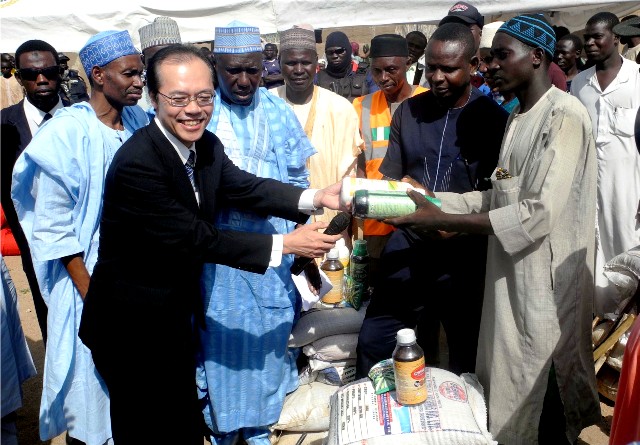Agriculture
Expert Tasks FG On Herders, Farmers’ Conflicts

An Anthropologist, Dr Adam Higazi has said government policies on addressing conflicts between farmers and pastoralists must be based on reality not sentiments.
Higazi, a post-doctoral research fellow at the Department of Anthropology, University of Amsterdam, made the remarks yesterday in Kaduna at a seminar organised by the French Embassy in partnership with The Pastoral Resolve (PARE).
The Tide source reports that the seminar addressed Ethnography and Scientific Knowledge as it relates to pastoralism and it’s Policy Implications in the country.
It also seek to identify the root causes and solutions to the clashes between farmers and pastoralists through necessary understanding of the way each one works within the society.
Higazi, in his presentation which touched on bridging knowledge gap in the study of pastoralism in Nigeria, said it was important for government policies to be anchored on sound knowledge, not ignorance or sentiments.
The scholar, who conducted fieldwork within nomadic and semi-nomadic Fulani communities in different states of central and northern Nigeria in August and September 2018, said knowledge would help improve policy making and success rate in containing the crisis.
According to him, the field work was to deepen anthropological and historical knowledge of the relationship between the two economic groups.
“The main objective of the research is that policy should be based on evidence and knowledge, policy should not be made based on ignorance.
“We should improve based on sociological and scientific knowledge and data which will be put into policy making on rural areas, and on pastoralism and agriculture.”
The Permanent Commissioner, Kaduna State Peace Commission, Dr Saleh Momale, noted that conflicts between pastoralists and farmers have remained a challenge over the last three decades in governing Nigeria’s rural space.
Momale explained that the disputes began over access to grazing areas, grazing and migratory routes, crop damages and use of lowland Fadama resources.
“The inability to effectively address the problems metamorphosed into violent conflicts in many parts of the country, leading to death of persons, destruction of properties and displacements of varying proportions.
“The growth of crime in form of cattle rustling, raiding of villages and kidnapping opened another dimension to the challenges of managing relations between pastoralists and farmers in particular, and enforcing the rule of law in the rural areas in general.”
According to him, in recent years, there is increasing occurrence of violent conflicts which are being interpreted in different ways.
” Even though a number of researches have been conducted to understand the key drivers of the conflicts, the outcome of the research works has not significantly impacted responses and policies of governments at all levels.
“This allowed for misinterpretation of the world-view of the pastoralists leading to enactment of inappropriate policies and responses in some areas.
“Overall, this created a vacuum that is filled by narrow-based perceptions that are not founded on empirical research.” he said
He said that Hagizi had since 2004 conducted research in Nigeria on the ethnography, scientific knowledge and policy making processes as it affects pastoralists.
Momale said that a seminar be held to allow participants respond to the findings of the research by Hazigi, and for them to contribute their perspectives and understanding on the issues.
” It is expected that at the end of today’s event, a summary of the discussions and recommendations will be prepared”.
“It is also expected that a policy brief to inform actions and interventions by all stakeholders including governments, civil society organisations and the media, among others will be prepared and disseminated.”
The commissioner assured the organisers and participants that the Kaduna State Government and the Peace Commission would work with suggestions arrived at during the event in promoting peace, security, social and economic development of the state.
He thanked the French embassy for the foresight to organise the event as its contribution towards resolving the lingering challenge of conflicts, livestock development and effective governance in the country.
“We also thank Dr Higazi for his interest and acceptance to share the results of his research work.
“We acknowledge and value the contributions of The Pastoral Resolve (PARE) is facilitating communications and linkages during the planning of this seminar.”
Agriculture
FG, Ogun Distribute Inputs To 2,400 Farmers
Federal Government and the Ogun State Government, on Wednesday, distributed farm inputs to farmers as part of effort to address food security challenge.
The State Director, Federal Ministry of Agriculture and Food Security, Dr. Toyin Ayo-Ajayi, during the flag-off ceremony of Inputs Redemption Under The National Agricultural Growth Scheme-Agro Pocket (NAGS-AP), in Ogun State, disclosed that beneficiaries of the gesture were primarily rice, maize and cassava farmers across the State.
Ayo-Ajayi commended the Ogun State Government for partnering with the government at the centre for the effort in supporting farmers with inputs that would bring about yieldings for local consumption and likely exportation.
She noted that government is supporting rice, cassava and maize farmers with inputs worth N212,000; N189,000 and N186,000 respectively.
The Permanent Secretary in the State Ministry of Agriculture, Mrs Kehinde Jokotoye, who represented the Commissioner in the Ministry, Bolu Owotomo, stated that traditional farmers are critical in food production, hence the need to encourage and support them with inputs that would bring about desired results during harvesting.
Owotomo said: “Let us make good use of this opportunity, so that the success of this phase will make farmers benefit more from the state and federal governments of Nigeria.”
Earlier, State Coordinator, Federal Ministry of Agriculture and Food Security, Dr. Oluwatoyin Ayo-Ajayi, appreciated the present administration for partnering with the federal government for the initiative, adding that the programme is designed to support farmers at the grassroots level in cassava, rice and maize with inputs such as, seeds, pesticides, herbicides and fertilizers, to boost their production and enhance their livelihood.
Agriculture
Niger Allocates 10,000 Hectares For Smallholder Farmers
The Niger State Government has mapped out 10,000 hectares of farmland in Gbapo Community of Katcha Local Government Area of the State for smallholder farmers to benefit from the state government’s agricultural intervention programme.
Two thousand out of the 10,000 holders of the farmlands have already received inputs.
At a flag-off ceremony in Yinti Village, the facilitator of the programme, Shinkafan Nupe, Malam Idris Usman Makanta, assured the farmers of increased distributions to the mapped-out ten thousand (10,000) farmlands if farmers respond positively.
He explained that the commencement of the two thousand is to measure the positive response of farmers before obtaining full-scale support.
Malam Makanta stated that this initiative aligns with the farmers’ initial commitment through Niger Foods, whose mission is primarily geared towards establishing efficient and profitable agricultural businesses to support the present administration of Governor Mohammed Umaru Bago’s quest to boost agricultural productivity in the state.
He also commended Niger Foods for their steadfastness and resilience in the effective implementation of the input financing scheme.
Makanta reiterated the commitment of the State Governor in making judicious use of the arable land in the state.
Shinkafan Nupe, therefore, urged the farmers to support the Governor by using the inputs wisely so that the dream can be actualised.
Agriculture
GO-CARES: Gombe Empowers 573,429 Farmers, Entrepreneurs
The Gombe State Government has empowered a total of 573,429 farmers and entrepreneurs under the 4th phase of the GO-CARES programme.
The programme was officially flagged off by Governor Inuwa Yahaya in another major step towards alleviating poverty and supporting the state’s vulnerable populations.
The Governor, while inaugurating the disbursement in Akko Community of Akko Local Government Area, restated his administration’s commitment to the welfare of vulnerable citizens in the state.
He was represented by the Commissioner for Budget and Economic Planning, Salihu Baba Alkali, who is also the Chairman of the Steering Committee on GO- CARES implementation.
“The 4th phase of GO-CARES will directly and indirectly impact a total of 573,429 citizens across the state. Of these, 152,429 individuals will benefit directly through cash transfers, livelihood grants, agricultural inputs, and operational grants to small businesses”, he stated.
The Governor added that, “421,000 people will be indirect beneficiaries through infrastructural projects such as classroom blocks, healthcare facilities, WASH services, and rural infrastructure projects like culverts and drainages”.
Yahaya, reaffirmed his commitment to ensuring that the state’s most vulnerable citizens are not left behind in the state’s development.
According to him, “Earlier this year, on June 25, 2024, we flagged off the distribution of improved seedlings, fertilizers, and herbicides to less privileged farmers in Malam Sidi, Kwami Local Government Area, signaling the commencement of the 4th phase implementation of GO-CARES under Result Area 2”.
The Governor reiterated that these initiatives have had a significant impact on the livelihoods of beneficiaries and the overall agricultural sector.
He explained that, “Today’s ceremony marked the simultaneous launch of activities under all three GO-CARES Result Areas for the 4th phase. These areas include: State Cash Transfer Grants: 2,500 direct beneficiaries; Labour Intensive Public Works: 2,700 direct beneficiaries; Livelihood Grants: 10,000 direct beneficiaries; and Basic Services: 405,000 indirect beneficiaries”.
-

 Sports2 days ago
Sports2 days agoEaglets Not In CAF’s U-17 AFCON Plans
-

 News2 days ago
News2 days agoPoliceman Commits Suicide In Niger
-

 Politics2 days ago
Politics2 days agoPrioritise Citizens’ Wellbeing To Avoid Dire Consequences, Don Warns Political Elite
-
Maritime2 days ago
Navy Seizes 265 Bags Of Cannabis
-

 Maritime2 days ago
Maritime2 days agoNigerian Customs Personnel And Smuggling Curtailment
-

 Business2 days ago
Business2 days agoBayelsa Begins EIA On 60MW Power Plant
-

 Rivers2 days ago
Rivers2 days agoOgonis Endorse Dialogue On Oil Extraction Resumption
-

 Sports2 days ago
Sports2 days agoFA Cup: Minnows Stun Liverpool, End Dream

